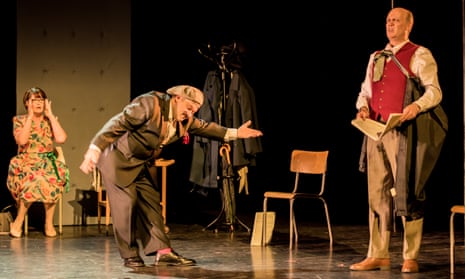I confess my heart sank at the sight of yet another black-box set. I’d been hoping for vibrant colour and visual seduction – after all, when Malcolm Arnold’s The Dancing Master was rejected for TV broadcast by the BBC in 1952, it was branded “too bawdy for family audiences”. The six school chairs, side table and hatstand on stage at Buxton’s opera house looked rather too prim. But with a crackle of static, an announcement in clipped RP and an “on air” light dropped from the flies, the stage became a radio studio, the opera reimagined by director and designer Susan Moore as a live broadcast.
It was a resourceful staging of a piece in which not much happens. There were good visual gags, from numerous cups of tea furtively poured and sipped between lines, to an array of comically low-tech sound effects (cutlery conjured a duel; cartoon smooches were slathered into a mic). And the small cast – on stage throughout – strutted, glared and flounced, unfaltering in their collective dramatic commitment. The vocal performances were consistently on the money. As the opera’s heiress heroine Miranda (the preservation of whose virginity drives the plot), Eleanor Dennis sang sweetly at first, later with polite abandon, while Catherine Carby was enjoyably acerbic as her maid, Prue. As Miranda’s protective aunt Mrs Caution, Fiona Kimm was deliciously matronly, while Graeme Broadbent (Miranda’s father, Don Diego), Mark Wilde (her fiance, Monsieur) and David Webb (his rival, Gerard) were the absurd trio contesting the heroine’s fate. In the pit, conductor John Andrews and members of the Northern Chamber Orchestra eked all the colour and energy they could from Arnold’s score.
The problem was the piece itself. Too much common-or-garden bitonality, not enough beauty, or humour, or internal contrast. Just an interminable discussion as to whether or not Gerard the dancing master is a dancing master (spoiler alert: he isn’t). And when the heroine finally declares she’s in love with Gerard after all, it’s lost in a melee of competing lyrics – a rookie error for an opera composer. It’s hard to imagine a better performance. But even that ultimately couldn’t prevent The Dancing Master from dragging its feet.

Comments (…)
Sign in or create your Guardian account to join the discussion